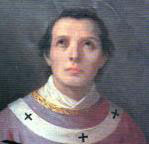Saint Anselm, the Archbishop of Canterbury
"And it assuredly exists so truly, that it cannot be conceived not to exist..." - St. Anselm, Proslogium - Chapter III. Anselm of Canterbury (1033-1109), was a Benedictine monk, a philosopher, and a prelate of the church who held the office of Archbishop of Canterbury from 1093 to 1109. Called the founder of scholasticism, he is famous as the originator of the ontological (or a priori) argument for the existence of God. An ontological argument is an argument that attempts to prove the existence of God by thinking alone. The premises for an ontological argument are derived from sources other than observation of reality, that is, solely from reasoning. This idea of proving the existence of God by thinking alone was later adopted by many, including Rene Descartes in the 16th century. Anselm was proclaimed a Doctor of the Church in 1720 by "Papal Bulla" of Pope Clement XI. Anselm's argument rests on the following five
premises: Conclusion: Therefore God exists. Anselm’s argument can be applied to the logical
steps of the Reductio ad absurdum method (‘reduction to absurdity’). The method starts by assuming the falsity of
the thesis. Of course Anselm’s argument is based on the definitions of ‘necessary’ and ‘contingent’ – subjects long debated in philosophy. In general, a necessary truth is a true statement whose negation must imply a contradiction in reality, such that the negation would be impossible. A contingent truth is a true statement whose negation does not imply a contradiction in reality, such that the negation could have been the case. The 18th-century German philosopher
Emmanuel Kant famously argued that the statement
"God exists" is not a ‘true’ proposition which requires a subject and a predicate. “Exists” says Kant, “is
not a predicate”. When you predicate something you ascribe a property to it. Following Kant’s
Subject-Predicate requirement we can entertain a new sentence using Anselm’s vocabulary: “God is a necessary
being”. In the Kantian framework the sentence is ‘synthetic’ which means that the predicate is not
contained in the subject (but can add to the subject). “Why Kant's Synthetic A Priori Is Problematic” is not an easy one to answer. Kant himself was not entirely clear on the distinction between analytic and synthetic (German to English translation notwithstanding). The brief discussion on Kant’s ontological argument on the existence of God was to acquaint the ‘novices of Kantland’, including the author of the Golden Seat, on the Kant’s philosophical terminology and mode of thinking. Further discussion of the matter involves rigorous analysis of his ‘800’ page ‘Critique of Pure Reason’, an effort that many professional philosophers are dedicated to. Suggested reading: " The Resurrection of Theism" (Stuart Hackett, 2009). z
|
